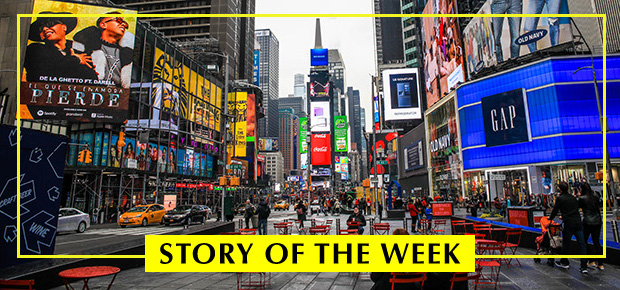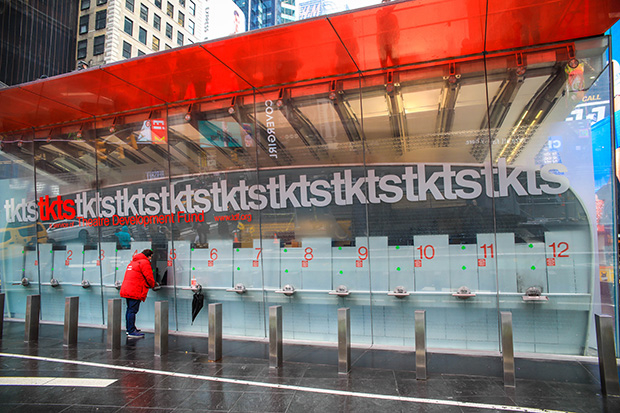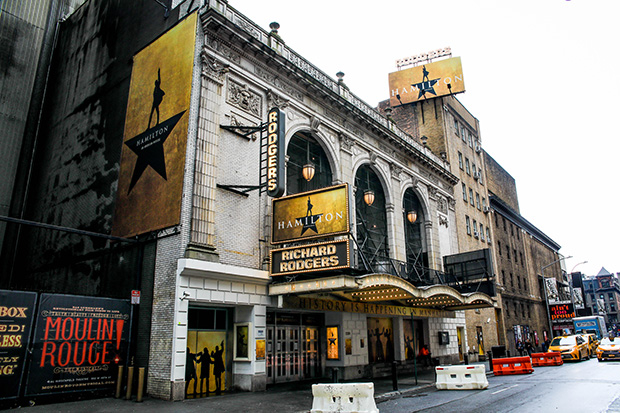A Week Without Broadway
The COVID-19 pandemic will be devastating for the New York theater, but there are reasons to be hopeful.

(© Tricia Baron)
This Story of the Week reviews how the COVID-19 pandemic is rapidly changing the theater industry, assesses how this is impacting the community of artists, and asks the question on every fan's mind: When will theaters open again?

(© Tricia Baron)
Are all of the theaters really shut down?
Yes, although it didn't happen all at once. After New York Governor Andrew Cuomo announced last Thursday that all Broadway theaters would close, and that smaller houses would be limited to 50 percent capacity, most venues made the decision to end performances either immediately or over the weekend. A few off-Broadway shows like Harry Townsend's Last Stand and Stomp declared their intention to play on at half capacity, but by Monday that was out of the question following another proclamation by the governor. The financial impact of these closures won't be fully apparent for months, but it is clear that the eventual damage will be substantial.
Theaters in New York and across the country have responded to this unprecedented loss of income by attempting to move their shows online. To help facilitate this, Actors' Equity (the union representing theatrical performers and stage managers), has made new streaming media agreements available to producers affected by the limitation of public gatherings.
"These new streaming agreements help protect the economic security of Equity members with additional weekly salaries and health care contributions," said Equity executive director Mary McColl. While both unions and producers have in the past been hesitant to jump into the bold new world of streaming live theatrical performances, the coronavirus crisis has very quickly caused all parties to reassess their positions. While these streaming agreements are only meant to be temporary for the period of the outbreak, I suspect that should this experiment prove successful, it will lead to a relaxation of resistance to streaming in the future.
The can-do attitude Broadway performers and fans have brought to the COVID-19 pandemic is best encapsulated in the Broadway Hand Wash Challenge, which calls on people to donate to a theatrical charity while recording a video of themselves washing their hands for 20 seconds and singing a favorite showtune. Hundreds of people are participating, including big stars like Stephanie J. Block, James Monroe Iglehart, and Jelani Alladin. It's a real testament to the ability of the community to take a bad situation and turn it into something joyous and positive — but really, what else would you expect from the culture that brought you Annie?
While appreciating the optimism of beloved Broadway stars, we shouldn't lose sight of the fact that for so many emerging artists, the COVID-19 shutdown is a door slamming in their faces. Playwright Noelle Viñas (who helps manage TheaterMania's Gold Club) knows several artists who, faced with the prospect of indefinite unemployment in both the theater and in their side gigs as waiters, have made the difficult decision to move back in with their parents. Some of them are already reconciling with the notion of not returning to New York City.
"There will be an exodus of emerging artists who will not return to New York, and that is deeply sad," she says. Viñas hopes that this crisis will force industry leaders to reconsider the way artists are compensated: "The industry has always played it close to the margins. Will this change the way that we create security for our artists? Will we start paying artists the minimum wage rather than stipends per project? How will this change the industry — and will it?"

(© Tricia Baron)
When can I see a Broadway show again?
According to the statement released by the Broadway League last Thursday, theaters are slated to reopen the week of April 13. However, the latest CDC guidelines recommend the cancellation or postponement of all events with 50 people or more (that would include all but the tiniest shows in New York) for eight weeks. That would mean reopening the theaters the week of May 11 — a date well past the originally scheduled Tony Awards cutoff (April 23) and the press openings of much of the spring season. Of course, all of that will have to be rescheduled. The League has already canceled its annual Spring Road Conference (scheduled for May 12-14), which invites presenters from across the country (many of them Tony voters) to New York to discuss what is happening on Broadway. All things considered, the prospect of Broadway reopening on April 13 feels increasingly unlikely.
"We are currently in discussions about the most recent recommendations from the Center for Disease Control (CDC) and are prepared to follow the direction of any mandated closures from city, state, and health authorities," the Broadway League said in a statement. The word "mandated" strongly suggests that the only way Broadway will push back its April 13 reopening is if the government forces it to, a similar situation to how Broadway persisted until last Thursday, when Governor Cuomo shut things down.
.@BorisJohnson has just doomed an entire industry by telling people not to attend the theatre.
By not enforcing a shutdown, production insurance will not apply so producers and shows will go bankrupt, and tens of thousands of people will be without pay.@hmtreasury @DCMS
— Patrick Gracey (@PatrickGracey) March 16, 2020
While this government intervention may seem draconian, it is preferable to the alternative. Just look across the pond, where the West End remarkably stayed open until Monday, when Prime Minister Boris Johnson advised the British public to avoid public venues like pubs and theaters, but stopped short of mandating their closure. In response, the Society of London Theatre (the West End's version of the Broadway League) announced the closure of all of its member theaters that evening. The Times has labeled Johnson's wishy-washy statement "the kiss of death" for British theaters, who now face a period of indefinite closure and little guarantee of compensation for lost revenue.
No one really knows when the theaters will open again, but they are going to need a lot of love to bounce back. The best thing you can do to help the theater community weather the pandemic is to stay engaged online, help financially support out-of-work artists as much as you can, and plan to return to the live theater as soon as the doors open again.








